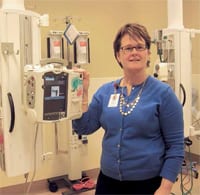Don’t Give Up on New Year’s Resolutions
How that January has come and gone, did your efforts to lead a healthier lifestyle as part of your New Year’s resolutions go by the wayside?
Don’t give up. Try again. You may have set yourself up for failure by trying to achieve too many goals at once. Doctors at Baystate Medical Center suggest setting realistic goals and prioritizing what is most important to you, taking small steps, and remembering not to beat yourself up if you encounter a setback. Tomorrow is another day.
Some healthy goals to consider on your journey to good health are:
Give up being a couch potato. “Inactivity is a public health problem and is responsible for a number of health concerns, from coronary heart disease to type 2 diabetes to cancer,” said Dr. Darius Greenbacher, medical director of BMP – Sports and Exercise Medicine. “Just two and a half hours a week of moderate-intensity activity and exercise can make a big difference in your health.”
Get a good night’s sleep. “Get those seven to eight hours of sleep your doctor recommends,” said Dr. Karin Johnson, medical director of the Baystate Sleep Center and the Regional Sleep Program at Baystate Medical Center. “Getting a good night’s sleep will help keep your blood pressure, cholesterol, and weight in check and your heart healthy. It also helps with brain function by keeping you more alert and improving memory, reduces stress, boosts your immune system, and repairs the body. While you’re sleeping, your cells will produce more protein needed to repair damage to your body tissue.”
Get vaccinated. “Vaccines aren’t just for kids, and they are safe,” said Dr. Daniel Skiest of the Infectious Disease Division at Baystate Medical Center. “Many adults need vaccinations because they were never immunized as a child, or because as people age, the immune system wanes, placing older adults at risk for certain infections. Adults need to get a flu shot every year and should talk with their doctors to make sure their vaccines are up to date.”
Don’t forget your medications. “Forgetting to take your medications can have serious consequences — for example, for someone with diabetes or heart disease, said Mark Heelon, medication safety officer with the Baystate Medical Center Acute Care Pharmacy. “There are many ways to help you to remember to take your prescription. Purchase a pill box. Buy an automatic pill dispenser. Set an alarm to go off on your cell phone. Relate your pill taking to daily activities, such as your morning coffee. Mark your bottles with different colors for the time of day you need to take them.”
Manage your stress. “Stress can result in some significant health problems, such as fatigue, high blood pressure, headache, heart disease, asthma, changes in appetite, obesity, diabetes, upset stomach, and more,” said Dr. Stuart Anfang, chief of Adult Psychiatry at Baystate Medical Center. “Psychological symptoms include depression, nervousness, anxiety, irritability and anger, lack of energy, and feeling as though you want to cry. Setting priorities, avoiding dwelling on problems, exercising regularly, participating in stress-coping programs like meditation or tai chi, and scheduling regular times for healthy and relaxing activities can help.”
In addition to setting goals, it’s good to remember that the recipe for good health has five simple ingredients: maintain a healthy weight, don’t smoke, keep your body moving, drink less alcohol, and eat plenty of fruits and vegetables along with whole grains and lean meats, nuts, and beans.
Baystate physicians also stress preventive care. So, before 2019 goes any further, make an appointment for an annual exam.
“Preventive medicine is a key component to maintaining a healthy lifestyle regardless of the time of year,” said Dr. Kathryn Jobbins or Baystate High Street Health Center Adult Medicine. “Developing an ongoing relationship with your healthcare provider, who knows you and your medical history, leads to a better overall outcome and lower costs.”



Comments are closed.